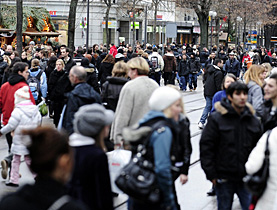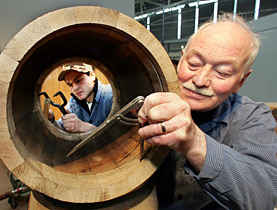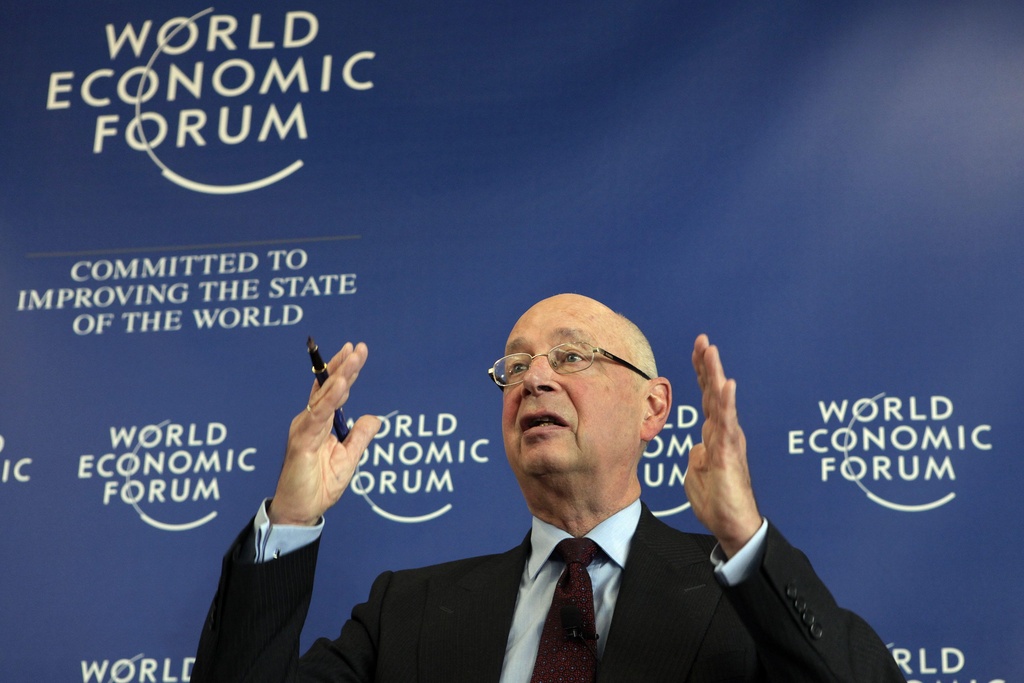Swiss technology tackles greying society

Technological advances could meet some of the challenges posed by an ageing global population, but the World Economic Forum (WEF) has heard that more needs to be done.
Swiss scientists in Davos outlined the latest medical, robotics, biomechanics and architectural research aimed at improving the lives of the elderly. But delegates also heard that tough political decisions would be necessary.
All demographic projections point to a marked increase in the number of pensioners in the next 50 years, coupled with a significant downturn in birth rates.
In Switzerland, the over-65s age group is tipped to make up a third of the population by 2050 compared to around 17 per cent at present. The phenomenon, which would be mirrored throughout the world, threatens to place an unbearable burden on social security and health systems while impeding economic output.
Some problems could be solved with technological advances aimed specifically at meeting the challenges. A team of professors from the Federal Institutes of Technology in Zurich (ETHZ) and Lausanne (EPFL) highlighted how such breakthroughs could relieve the burden on the public purse as well as on pensioners.
Science keeps you working
Breakthroughs in the field of biomechanics, for example, have made it possible to estimate the likelihood of bone fractures caused by normal domestic tasks such as lifting shopping bags. Such data could form the basis of preventative medical treatments, saving not only suffering but also more lengthy post-accident repair work.
Designing homes with the elderly in mind would both enhance the independence of occupants and reduce the need for household help. The use of robots and artificial intelligence could also serve similar functions, according to Dario Floreano, director of the Laboratory of Intelligent Systems at EPFL.
Floreano’s research includes sensors that monitor fatigue levels to indicate how much physical activity can be safely undertaken. He is also developing robotic exoskeletons that would give walkers or lifters an extra boost and an array of robotic domestic help.
“Research shows that bad lifestyle management is responsible for 75 per cent of the ageing problems that people experience,” he told swissinfo.ch. “This type of technology could help people to work longer in physically demanding jobs and to enjoy more independence in their own homes.”
Retirement age debate
Research funding from Switzerland and the European Union is plentiful, according to Floreano, but the commercial applications of many projects have yet to be realised. One of the problems to be tackled in Switzerland is producing an end product that does not fill the consumer with dread.
“Japanese society is open to humanoid robots,” he said. “But the Swiss do not seem to like robots that look like living organisms and try to interact with us – they find it creepy.”
But technology – even future breakthroughs – can only go so far in meeting the challenges of an ageing society. Swiss voters will be asked to decide in March whether to raise the age of retirement or to cut pension payments to relieve the creaking social security system.
Thomas Held, director of Swiss think tank Avenir Suisse, told one WEF session in Davos that Switzerland could no longer cling on to a retirement age that was set generations ago when life expectancy was much lower.
“Increasing the retirement age to 69 [years of age] would not be attacking the social welfare system. But if we maintain the current situation then that would certainly represent an attack,” he said.
Voting power
Held also cast doubt on the sense of expanding medical and technological services, arguing that it placed a greater burden on the health system and encouraged people to seek medical solutions too readily.
“Standards have changed,” he said in Davos. “Benefits once considered inaccessible and unthinkable, such as hip replacements, are now seen as a natural right.”
However, other panelists at the debate – such as Angelina Fankhauser of the Grey Panther elderly rights pressure group – made it clear that such views would not go unchallenged in Switzerland.
“There are many people who think that there are too many of us [pensioners], that we live too long and are too much bother,” she said, before pointing out that the “many” have always had a proportionally greater say at the ballot box.
Matthew Allen in Davos, swissinfo.ch
The number of people in the world aged 60 or older has tripled since 1950 and is projected to triple again by 2050, according to a United Nations report published in 2001.
The report estimated that there were around 205 million over-60s in 1950, increasing to 606 million in 2000 and tipped to expand to some two billion by 2050.
At the same time, birth rates – particularly in developed countries – are dropping. As a result, the elderly segment is continuously comprising a higher proportion of the total global population.
In 1950, one in 12 people was aged 60 or over and one in 20 was 65 or older, according to the UN report.
Over-60s represented one tenth of the population in 2000 while one in 14 was 65 or older. The corresponding figures for 2050 are projected to be one in five over-60s and one in six over-65s.
Research published by the Federal Statistics Office last year showed that people aged at least 64 had made up 5.8% of the Swiss population in 1900 and 16.4% in 2007.
The proportion of people aged 80 or older climbed from 0.5% in 1900 to 4.7% in 2007.
In contrast, the proportion of under-20s has fallen from 40.7% to 21.5% in the corresponding time frame.

In compliance with the JTI standards
More: SWI swissinfo.ch certified by the Journalism Trust Initiative






You can find an overview of ongoing debates with our journalists here. Please join us!
If you want to start a conversation about a topic raised in this article or want to report factual errors, email us at english@swissinfo.ch.